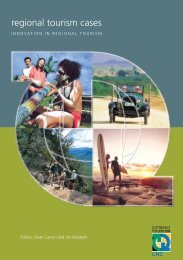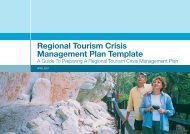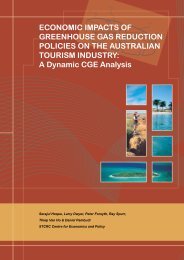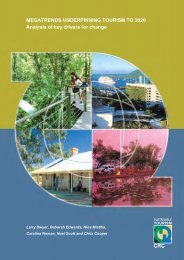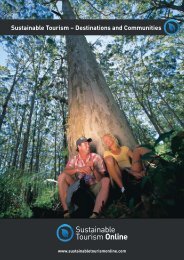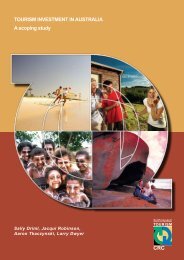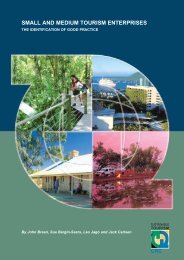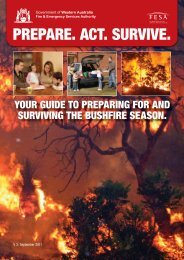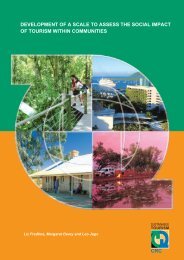Tourism Risk Management - Sustainable Tourism Online
Tourism Risk Management - Sustainable Tourism Online
Tourism Risk Management - Sustainable Tourism Online
Create successful ePaper yourself
Turn your PDF publications into a flip-book with our unique Google optimized e-Paper software.
international awards for quality of product and service, there appears to have been minimal public<br />
or tangible actions to address concerns regarding risk, safety and security.<br />
Declining numbers once again saw a reduction in air services and routes. The locally established<br />
Air Paradise airline collapsed as a consequence of mounting business costs. As the traditional<br />
market base continues to change, the industry has strived to promote niche markets such as health<br />
tourism and a more culturally based experience. For much of the travelling public Bali has now<br />
become associated with the problems of greater Indonesia including political and social unrest,<br />
terrorism and natural disasters. While the industry has supported local education, training and<br />
scholarship programs, and strived to improve community cooperation and relations, continued<br />
issues of resource use and environmental destruction undermine collaborative efforts. As the<br />
people of Bali demonstrate remarkable resilience and persistence, the island still struggles to<br />
recover from this crisis of consumer confidence.<br />
Although Bali has yet to see a revival of revenues or tourism numbers, the second terrorist attack<br />
reveals the value of learning from past experience. Whether or not as a consequence of improved<br />
safety precautions, the bombing and subsequent damage was significantly reduced in the 1<br />
October 2005 incident. Experience, networks and skills that had been developed assisted in:<br />
• effective coordination of emergency response personnel and resources;<br />
• establishment of an identifiable operations and media centre;<br />
• identification of a credible spokesperson to brief the media;<br />
• improved communications capacity utilizing honesty, authority and placing the incident into<br />
the wider context; and<br />
• greater integration of community, industry and government strategies.<br />
While tourism and industry sustainability is yet to be achieved for Bali, their experience<br />
demonstrates the value of awareness and the processes involved in risk and crisis management. It<br />
should be a continuous, collaborative effort that all stakeholders strive to understand and improve.<br />
Similarly, while tourism may seem relatively resilient, destinations and stakeholders must consider<br />
and plan beyond immediate issues.<br />
(Source: Bali Discovery, 2006; Bali SOS, 2006; and PATA, 2006)<br />
Preventing Organized Crime<br />
At the national level, tourism authorities can assist the actions of police and other agencies in<br />
combating organized crime by supporting actions designed to prevent criminals and weapons<br />
entering their country. This includes endorsing the use of control systems at airports and other ports<br />
of entry.<br />
Another measure in preventing organized crime is to identify the nature of violent or criminal acts and<br />
to design relevant information campaigns for visitors and the domestic and international travel trade.<br />
Organized violent crime is usually highly targeted, even though it may appear random.<br />
When Mexico, for example, realized that it had crime problems related to automobile and coach<br />
travel, it instituted a visitor police highway service, the ‘Green Angels’ (a fleet of radio-dispatched<br />
trucks with bilingual crews operating daily to provide protection, medical first aid, mechanical<br />
assistance, and basic supplies to travellers), and developed and disseminated information materials<br />
for visitors on safe travel by car and coach in Mexico.<br />
44 <strong>Tourism</strong> <strong>Risk</strong> <strong>Management</strong> – An Authoritative Guide to Managing Crises in <strong>Tourism</strong>



